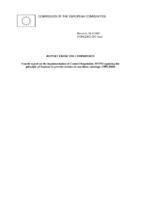Fourth report on implementation of Council Regulation 3577/92 applying the principle of freedom to provide services to maritime cabotage (1999-2000). Report from the Commission.

COM Document
Συγγραφέας
EU Commission
Ημερομηνία
2002-04-24Προβολή/
Θεματικές επικεφαλίδες
Transportation policyΠερίληψη
This is the fourth two-yearly report on the application of the cabotage Regulation. It coversthe years 1999 to 2000. Like the previous reports, this report has been based on a studycarried out on behalf of the Commission.Almost all cabotage services in Europe have been liberalised since 1 January 1999. The Greekmarket, which is the last to still be partly protected, will be opening up to Communityshipowners as from 1 November 2002. The adaptations of Member States' legal provisions tothe cabotage Regulation will soon be completed.The first part of the report describes the state of play regarding legislation. It states which ofthe Community second registers may take part in cabotage. Among vessels registered in aMember State, only those in the Italian second register and passenger vessels in the Danishsecond register do not have access at the present time to Community cabotage. In otherwords, Italy and Denmark do not authorise those particular vessels to carry out cabotage intheir respective countries. The report also specifies the rules on manning imposed by certainMember States on vessels carrying out cabotage with islands. Finally, for the first time, anannex recapitulates the public service obligations laid down by the Member States.This new phase of liberalisation has not adversely affected the market. Cargo volumes(260.99 million tonnes in 1999) and the number of passengers (152 million in 1999)transported have remained relatively stable. The five Member States concerned by this newphase of liberalisation (Spain, France, Greece, Italy and Portugal) have tackled it byimproving the quality of their fleets. Penetration by foreign vessels into the national cabotagemarkets remains limited in the majority of the Member States.The second part of the report presents detailed statistics by country including, in the case ofcargo, the breakdown according to type of cargo transported depending on whether it wasisland or mainland cabotage. The greatest market for cargo traffic is that of the UnitedKingdom, followed by that of Italy. Liquid bulk heads the league table in terms of cargotransported. In the case of passengers, Greece has the greatest traffic, followed by Italy andthe United Kingdom.Finally, the last part of the report gives manning costs for three types of cargo and three typesof passenger vessel. The most expensive register is the Finnish register. The Portuguesesecond register, the MAR register, is the least expensive in Europe.Given that the liberalisation of the market will soon be completed and in the light of thedifficulties encountered in collecting the statistics needed to draw up this report, theCommission speculates in its conclusions on the form which future cabotage reports will haveto take. It considers that forthcoming reports could be drawn up on the basis of answers fromthe Member States to a questionnaire addressed to them by the Commission. This would bethe most economical solution because it would avoid having recourse to often costly studies.It would make it possible to set up a consistent and uniform database on the subject availableto everybody. The Commission is inviting Member States and interested parties to give theiropinion on this question.
